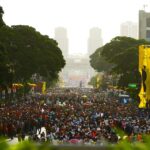
A crime of hate is one that has as motive the political or religious identity of the victim.
So far this year, an accelerated growth of hate crimes has marked the antichavismo roadmap and regime change operators.
In each of the high points of the last months (the self-proclamation of Guaidó, the electric sabotage and the failed coup), extremist groups emerge that besiege the Chavista population. To date, at least 37 crimes of this type have been carried out under the direct promotion of the US political high command and the local leadership of Venezuelan fascism.
WHAT IS A HATE CRIME AND WHO COMMITTED IT?
Hate crimes are those attacks that endanger the lives of groups of people because they have a fixed cultural, religious or political identity. In the Venezuelan case, those registered in recent years have transgressed the public tranquility and threatened the physical integrity of citizens who identify with Chavismo.
The violent episodes that occurred between 2014 and 2017 forced the public authorities of the Venezuelan State to delimit a category of hate crime to incorporate it into national legislation.
In these two examples and with special emphasis on the guarimbas of 2017 that for more than three months altered the social order in the territory, there were recurrent reports of death threats, beatings, lynchings, burning of people and murder due to their political affiliation with the chavismo, allowing a pattern for hate crimes to be established.
RELATED CONTENT: Tales of Resistance: “So Much Work and Nothing to Show for It”
These attacks on the physical integrity of Venezuelans were also determined by skin color and social status of the people, traits that were automatically taken as identification with chavismo.
The hatred promoted extended the aggressions to the symbols of chavismo, so that health centers, schools and other public institutions were the focus of violence.
To halt the chaos and return to normality in the territories of confrontation, the National Constituent Assembly took as its first task after its installation, to legislate in order to eradicate and prevent these forms of political violence with the aim of protecting the stability of the nation.
CASES OF POLITICAL VIOLENCE FROM JANUARY TO MARCH 2019
Days before the self-proclamation of Guaidó in a plaza in Chacao on January 23, violent protests were activated in areas of Caracas that resulted in the burning of the Robert Serra cultural house.
Then, violent groups that were concentrated in the center of the city of Maturín (Monagas) moved to the house of the PSUV to set it on fire in the framework of the announcement of the parallel government.
RELATED CONTENT: Opposition Deputy and Coup Leader Edgar Zambrano Detained (+ Video)
In the month of March, during the attacks on the National Electric System, there was an escalation in hate crimes in response to instigation of violence that the anti-Chavez leadership has been issuing to attack the Chavista population and discourage the various mechanisms that have emerged from popular organization to face the induced deterioration of basic services and the prolongation of the economic blockade.
The Public Ministry denounced, among other cases, the intimidation of an elderly person in Caracas, father of a journalist from La Radio del Sur, who was persecuted and assaulted by his neighbors causing head and leg wounds.
Likewise, the fire at the home of the mayor of the Tadeo municipality of Táchira state, Betzabeth Gandica, who was there with seven children when she was evicted and then fire set to the house.
APRIL 30: CRIMES AGAINST CHAVISMO AND FIGURES OF THE MILITARY INSTITUTION
In a record of the damage caused to the country after the failed coup headed by Guaidó and the fugitive from justice Leopoldo López, the Public Ministry made a balance sheet detailing that there was a death toll of five people and that another 233 were arrested to investigate their involvement in the attempt.
But the Prosecutor also ruled on the last 30 hate crime reports that the Public Prosecutor’s Office received and that are being investigated. These occurred during the hours of the failed coup d’etat on April 30.
He reported on the case of a Venezuelan assaulted for identifying himself as a Chavista in the state of Aragua. The way in which he was persecuted and attacked by those who came to the call of “Operation Freedom” recalls the violent actions of extremist groups that in 2017 burned, stabbed and ended the life of Orlando Figuera in the middle of an anti-Chavez demonstration in the plaza Altamira
For his part, the Minister of Defense, Vladimir Padrino López,denounced the attack on Colonel Yerson Jímenez Baez, Chief of Operations of the Area Command No. 43 of the National Guard, who was shot while on the Francisco Fajardo highway, controlling the opposition protesters who threatened to enter the facilities of the La Carlota Air Base.
In total, 8 military officers of the FANB were wounded by firearm attacks. The army guarded the military base from the small group of deserters that accompanied the coup plot of Guaidó and Leopoldo López, and also contained the violence that was activated later in the east of the capital city.
BOLTON AND RUBIO: PROMOTERS OF EXTERMINATION
The multiple calls to the FANB that the White House has made to force regime change are combined with propaganda messages that criminalize the part of Venezuelan society linked to Chavismo.
In that sense, it has been stated in (public) statements and in the personal social networks of John Bolton and Marco Rubio, the special interest of Washington to increase the option of a sectarian conflict in the style of the Islamic State in Syria, but with political hatred in practice.
The internal chaos intended to be unleashed would disguise the intervention of the United States in the scene, delegating the task of exterminating the chavismo of the territory to local irregular groups, emulating the unconventional methods of the financial blockade to annihilate the options of economic recovery from the country.
Therefore, the priority that the Venezuelan State has given to legislations in this respect as a counter-offensive to categorize and prosecute in good time any outbreak of hatred that threatens the very existence of Venezuelan society.
Translated by: EF/JRE
| Website





